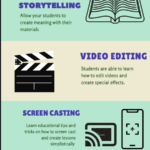List some possibilities you see for digital storytelling or screencasting in education:
Currently, I am in my third year of the B.Ed program at Uvic, studying to become an elementary educator. I continue to learn new information regarding learning and technology, as well as how we are living in an age of digital integration, and educational disruption. The typical idea of a classroom is changing and evolving to provide students with the environment and instruction methods to aid meaningful learning. The way we teach should be to captivate students’ interests and inspire their passion for knowledge.
The integration of technology only advances this adaption and allows teachers the ability to draw from resources and media platforms. This week we discussed the importance of digital storytelling and screencasting. We began to learn how educators can use these resources to engage students and promote meaningful learning.
A few weeks ago we discussed the learning theories (cognitive load, duel-coding, and constructivism) to explain how individuals retain and understand knowledge. The processing rate of information in the human brain is fairly simplistic and is constructed through mental representations of the information that is presented to them.

Therefore, the educational possibilities for digital storytelling or screencasting are endless and allow teachers to attach meaning with students’ knowledge intake. Some ways that I plan to integrate digital storytelling in my future classroom involve utilizing online resources for the First Peoples Principles of Learning and allowing professional resources to educate and immerse the students with their culture and history in a way I am unqualified for. This can be said for an area of instruction that I feel underqualified or less confident to teach, such as cultural music, artistic demonstrations, mathematical analogies, etc. With the advancements of public communication and social media, we as individuals have the ability to create, curate, and share information like never before. If my students are not grasping a topic, I can find resources and digital stories that share the information in meaningful ways for students to gain various multiple multimedia learning principles to strengthen their knowledge retention and understanding. In addition to this, teachers are also able to utilize screencasting and have the students create their own digital stories. They are then able to attach their own knowledge and skills to their projects and activities, allowing for ample success and interactive projects.
For my multimedia final assignment, my partner and I are planning on creating a resource for teachers to use to help understand the basics of the iMovie software, for students to use in their projects.
Overall, with the abundant information and intellectual resources on the world wide web, educators now have the opportunity to utilize digital stories/ screencasting. Students are able to connect meaningfully with the material and learn from multiple multimedia learning principles in order to shape their understanding and attach meaning to their knowledge intake.
Example of Screencasting
Here is an example of screencasting on the software iMovie. It teaches the viewer how to use PowerPoint to edit images.
References:
Cunningham, M. (2021). Image Editing with Bernie Sanders. EDCI 336. Retrieved from https://mollycunningham.opened.ca/2021/01/27/image-editing-with-bernie-sanders/
Cognitive Theory of Multimedia Learning. (2011). In ETEC510: Design Wiki. http://etec.ctlt.ubc.ca/510wiki/Cognitive_Theory_of_Multimedia_Learning
Digital storytelling. (2017, September 10). In Wikipedia, The Free Encyclopedia. Retrieved October 5, 2017.
Lynch, M. (2017, November 7). How Digital Storytelling Can Amplify Your Students’ Voices. Retrieved November 14, 2017.
Fell, A. (2017). Why Storytelling is so Powerful in the Digital Era [Video]. TEDx Talks. Retrieved from https://www.youtube.com/watch?v=mSi0kmqOBu4&t=866s
Mayer, R. (2019). Cognitive Theory of Multimedia Learning. McGraw Hill. Retrieved from https://www.mheducation.ca/blog/richard-mayers-cognitive-theory-of-multimedia-learning




lukejr
June 6, 2021 — 3:23 pm
Nice screenshare video. Also glad to see you demonstrating creative commons and photo crediting. First Peoples Principles of Learning are great to incorporate as well.